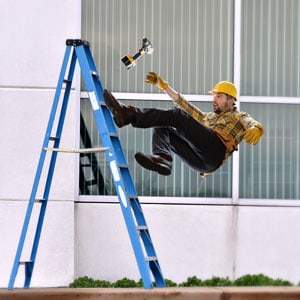
Getting up on a ladder or scaffolding is, whether you feel it or not, an act of trust. Trust in the company that manufactured the ladder or in your employer who set up the scaffolding. When that trust is betrayed, and someone acts negligently, and it results in an injury or death, justice can be sought with a personal injury claim. This article explains the essentials you need to know about Texas ladder or scaffolding incidents and injuries, including:
- The building and workplace codes and safety standards for ladder and scaffolding use in Texas.
- Who can be held legally responsible for a fall and injury, even if you are partially at fault.
- How to document your injury and prove negligence in a ladder or scaffolding injury.
What Are The Specific Safety Standards For Ladders And Scaffolding In Texas?
Texas adheres to the US OSHA (Occupational Safe and Healthy Administration) regulations, including for ladder and scaffolding use. As a result, there are requirements for
- Regular inspections for ladders and scaffolds,
- The acceptable dimensions of scaffolds,
- The way scaffolds are set up and constructed,
- The materials that are used in either.
Inspections help identify damage to a scaffold or a ladder that could impact its performance, requiring it to be taken out of service and repaired.
OSHA regulates all work from heights above six feet or more. In other words, if an employee is going to be on a ladder that requires them to be six feet above the ground, those rules apply, even on everyday stepladders. If you’re on the top step of a basic ladder that is six feet above the ground or on any kind of extension ladder or scaffold, both single-level scaffolds or multi-level scaffolds, they are all regulated.
This means that they have to be inspected to ensure they comply with all safety codes and regulations. Those inspections, in turn, have to be documented, and the repairs need to be made before anybody can be asked to climb on the ladder or scaffold.
Who Can Be Held Liable For A Fall From A Ladder Or Scaffolding?
When someone falls from scaffolding, it is usually the result of faulty scaffolding and or faulty personal protective equipment. Fall safety protection equipment, such as lanyards and other devices, is meant to ensure that even if someone working at height slips, trips, or falls, they don’t fall all the way to the ground. Other injuries can be caused when scaffolds collapse or move and are especially likely when workers do not have the proper safety equipment.
In such incidents, the responsible parties include everyone who had a role in putting that employee in that position, whether that be the immediate employer, the general contractor or the construction manager who is in charge of the work or site.
Oftentimes, multiple companies make decisions to put somebody in a dangerous condition where they could fall from a scaffold. This means all of them, from the employer to any other construction company involved, can usually be held legally responsible.
How Do We Prove That Negligence Caused A Fall?
With falls from scaffolds, the injuries are generally more severe, and they require hospitalization if the person is fortunate enough to survive, as all too often, a fall from a scaffold results in death. In either case, there will often be both a police and OSHA investigation into the circumstances of the fall, and they will determine fault.
Both in the initial investigations that are triggered after the incident and in our private investigations, it will be determined whether there were job safety analysis forms filled out beforehand. This is because every time somebody gets up on a scaffold, they are supposed to run through a checklist with the employer or contractor of what could go wrong and how to avoid it.
Far too often, we will discover that the employer did not have the Job Safety Analysis form (JSA form) filled out. That alone is clear negligence because the workers are then not in a position to take the necessary steps to protect themselves. Other examples of fault or negligence include
- Not doing job safety analysis,
- Not having toolbox meetings in the morning where they go over safety measures,
- Not documenting those meetings,
- Not inspecting the equipment on a regular basis for safety,
- Not having personal protective equipment.
Those are all different ways in which companies can be found negligent after a workplace fall from a ladder or scaffolding.
Can I Still File A Claim In Texas If I Was Partially At Fault For The Fall?
It is almost inevitable that the employer or insurance company will try to blame you. In nearly every case we have ever had, the company tried to put the responsibility on the injured worker. However, in the vast majority of these cases, the majority of the responsibility fell squarely on the employer and / or other companies.
Unless it is determined that you bear a majority of the responsibility for the fall, i.e., more than 50%, you have every right to recover. In the end, it may be up to a jury to decide the percentage of responsibility, which will inevitably be up for debate. But even if they do decide you bear some fault for the accident, that does not bar you from your right to bring a claim and obtain compensation.
How Can I Properly Document The Accident To Support My Claim?
The number one thing to do (if you are able to) is to immediately notify your employer. OSHA should also be contacted immediately because while employers are supposed to notify OSHA, they frequently fail to do so. OSHA will then do its own investigation of the circumstances of the fall.
Once you have notified your employer and OSHA, you should notify an attorney immediately. If it is a family member who has fallen and been injured, and they are not in a position to do those things, their spouse or parent should contact an attorney like myself. We can make sure that all of the necessary entities are put on notice and that an investigation starts.
What Should I Do If I’m Unsure Whether Or Not To File A Claim For A Fall-Related Injury?
If you are not sure whether to file a claim after a fall, consult an experienced lawyer who knows the industry. We can help you understand your rights and possible remedies. The Escamilla Law Firm has been representing clients in this type of workplace accident for more than 20 years.
There is no need to spend a lot of time, stress and uncertainty trying to figure out what your rights are and how to protect them. If you contact an attorney immediately, we will take over that responsibility, and you can focus on healing and helping your family.
Have you or a loved one been injured or killed in a fall from a ladder or scaffolding?
For more information on What To Do If You’re Injured By A Fall From A Ladder Or Scaffolding In Hidalgo County, Texas, a free initial consultation is your next best step. Get the information and legal answers you are seeking by calling (956) 305-3928 today.
